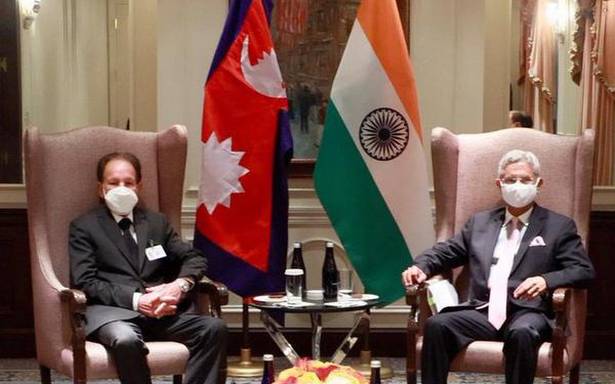Addressing the General Debate of the UNGA’s final day on September 27, Narayan Khadka said that Nepal’s worldview is shaped by its adherence to the principle of ‘amity with all and enmity with none’.
Nepal’s friendship with both neighbours, India and China, remains of “paramount importance” in the conduct of its foreign policy, the country’s new Foreign Minister Narayan Khadka has said at the high-level 76th United Nations General Assembly.
Addressing the General Debate of the UNGA’s final day on Monday, Mr. Khadka said that Nepal’s worldview is shaped by its adherence to the principle of ‘amity with all and enmity with none’.
The government of Nepal led by Prime Minister Sher Bahadur Deuba is “committed to conduct the foreign policy on the basis of sovereign equality, mutual respect, and mutual benefit and remains engaged with all friendly countries in the wider international community,” he said.
“Our friendship with both of our neighbours, India and China, remains of paramount importance in the conduct of our foreign policy based on the principles of Panchsheel — five principles of peaceful co-existence, derived from the teachings of Lord Buddha, the enlightened son of Nepal,” he said.
The relevance of these principles as a framework for interstate relations cannot be overstated in the present context, Mr. Khadka, who was appointed as Nepal’s Foreign Minister on September 22, said.
“Principles and purposes of the U.N. Charter, non-alignment, international law and norms of world peace form the basis of our foreign policy,” he said.
External Affairs Minister S. Jaishankar had met Mr. Khadka on the sidelines of the UNGA session in United Nations on Sunday and tweeted, “Pleased to welcome my new Nepali colleague, Dr. Narayan Khadka. Agreed that we should work together closely to take our special relationship forward.” Last week, Mr. Jaishankar had said he looks forward to working with Mr. Khadka as he congratulated him on his appointment.
Mr. Khadka told the General Assembly that “we live in troubled times” and asserted that there has been a dramatic shift in geopolitics and geo-economics in the post-Cold War era posing unprecedented challenges on all fronts.
“The world’s economic center of gravity is shifting decisively towards Asia, centered on the economic growth of China and India. At the same time, the world is becoming more complicated and polarised, with transnational challenges ranging from terrorism to climate change to food security to mass migration to political radicalism and extremism,” he said.
He said that under the cumulative impact of all these factors, “we are experiencing new ways of life in the midst of confusion and uncertainty. We see conflicts in different parts of the world, these conflicts are more within nations than between nations. This has given rise to identity politics. Nations find themselves increasingly divided along lines of race, ethnicity, gender and religion.”
He called on the international community to find a “common ground” and practice tolerance and harmony to confront these unimaginable problems.
“My delegation considers that democracy and multilateralism have no alternative to overcome the stresses and strains of the day. It is also the best antidote to the risk of civil conflict in ethnically diverse societies,” he said.
Addressing world leaders, Mr. Khadka also expressed gratitude to India and China for their support to the Himalayan nation in the fight against the pandemic.
“In Nepal, saving lives, strengthening the health system, and pursuing economic recovery and transformation underpin our efforts to build a sustainable and resilient recovery. Despite constraints and challenges to access COVID-19 vaccines, we have been able to vaccinate close to 20% of our population.
“We remain grateful to our immediate neighbours-India and China for their support in fighting the Covid crisis,” he said and also thanked “friendly countries” like the United States, Britain, Japan and others for providing vaccines, critical medical equipment, and medicines in Nepal’s fight against the pandemic.
Condemning terrorism in all its forms and manifestations, Nepal denounced all activities aimed to fuel social discord, communal conflicts, and intolerance.
“There is a need of robust global cooperation to effectively implement the UN Global Counter-Terrorism Strategy, to combat and control financing of terrorism, and to fight the organised trans-border crimes. This underlines the urgency for conclusion of a comprehensive convention against terrorism,” Mr. Khadka said.
Mr. Khadka also termed as “worrisome” new signs of arms race through modernisation of nuclear arms, and weaponisation of outer space among big powers.
“We call upon them to divert precious resources from military spending to addressing the COVID-19 pandemic and lifting the most vulnerable people out of poverty.
“The mechanisms of disarmament as well as the measures of non-proliferation and confidence building have been stalled. Nepal calls for general and complete disarmament of all weapons of mass destruction in a time-bound and verifiable manner,” he said.
Source: Read Full Article

